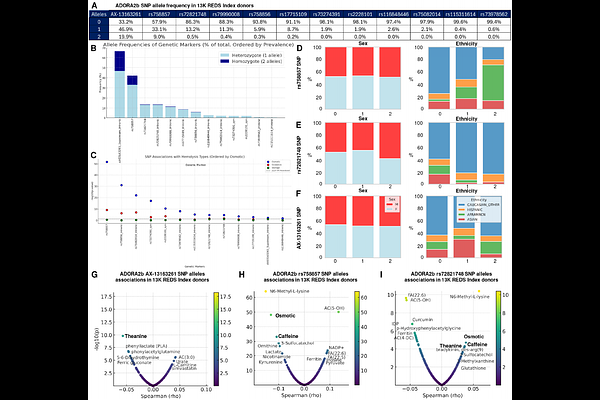Caffeine Impairs Red Blood Cell Storage Quality by Dual Inhibition of ADORA2b Signaling and G6PD Activity

Caffeine Impairs Red Blood Cell Storage Quality by Dual Inhibition of ADORA2b Signaling and G6PD Activity
Dzieciatkowska, M.; Hay, A.; Issaian, A.; Keele, G. R.; Bevers, S.; Nemkov, T.; Reisz, J. A.; Maslanka, M.; Stephenson, D.; Moore, A.; Deng, X.; Stone, M.; Hansen, K.; Kleinman, S.; Norris, P. J.; Busch, M. P.; Page, G. P.; Roubinian, N. H.; Xia, Y.; Zimring, J. C.; D'Alessandro, A.
AbstractCaffeine is the most widely consumed psychoactive substance globally, yet its peripheral physiological effects remain incompletely understood. Leveraging comprehensive data from 13,091 blood donors in the REDS RBC Omics study, we identify caffeine as a significant modulator of red blood cell (RBC) storage quality and transfusion outcomes. Elevated caffeine levels were reproducible across multiple donations from 643 recalled donors, selected based on their extremes in hemolytic propensity. Both in the screening and recalled cohorts, higher caffeine levels were associated with disrupted RBC metabolism, characterized by reduced glycolysis, depletion of adenylate pools or 2,3-bisphosphoglycerate, and increased markers of oxidative stress and osmotic fragility, including kynurenine accumulation. These observations were recapitulated in plasma and RBCs of eight volunteers upon consumption of a cup of coffee independently of brewing method (Chemex vs espresso). Clinically, elevated caffeine correlated with increased hemolysis and lower post-transfusion hemoglobin increments, especially pronounced in recipients transfused with RBCs from donors carrying common polymorphisms in the ADORA2b gene, a key regulator of RBC metabolism in hypoxia. These human findings were mechanistically validated using a murine model deficient in ADORA2b, which demonstrated impaired glycolytic flux, compromised antioxidant defenses - including caffeine-dependent direct inhibition of recombinantly-expressed glucose 6-phosphate dehydrogenase, and decreased transfusion efficacy (lower hemoglobin increments, higher bilirubin post-transfusion), effects further exacerbated by caffeine exposure during storage. Our study positions caffeine consumption as a modifiable factor in blood transfusion practice, advocating for precision strategies that integrate genetic and exposome factors, and identifies metabolic interventions to enhance blood quality and clinical outcomes.